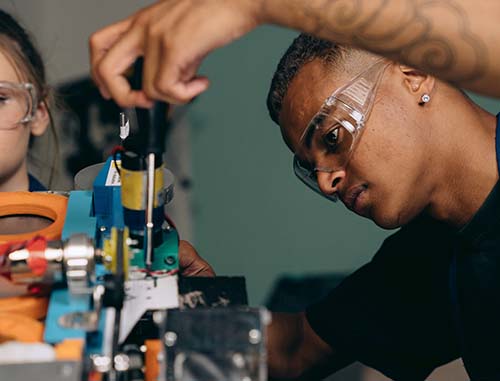
February 20, 2023
“…the international education community has recognized the transformative power of education and the value of learning throughout life for individuals, communities and societies.”1
-UNESCO Institute for Lifelong Learning
In the midst of the generational health crisis, in August 2020, the United Nations Educational, Scientific, and Cultural Organization (UNESCO) released an important report entitled, “Embracing a culture of lifelong learning”— a ten-point call to action to transform our educational culture and systems into one that lasts a lifetime, as opposed to a point in time.
For many, formal education stops at high school or college; yet given the ever-changing economy, periodic upskilling is required to ensure people are equipped for the jobs of today and tomorrow. And, as important as upskilling is to meeting workforce demand, lifelong learning is critical in order to solve our most vexing global challenges—like food hunger or climate change. Confronting these or other emerging challenges requires a culture of education where we constantly rethink and learn.
Lifetime learning sees value in formal and informal education—i.e., not only formal institutions, but also how one’s life experience can be translated into formal educational credentialing. But by and large our institutions and systems are not built for this approach, with the UNESCO report finding, “For decades, policy-makers have been striving to place lifelong learning at the heart of their education agenda. Today, making lifelong learning a reality remains an aspiration.”2
At The Fedcap Group, we’re developing programs to turn aspiration into actuality, especially for underserved communities who face obstacles to education that leave them further and further behind. We are breaking down barriers to education by building pathways from early education through workforce trainings and college with on- and off-ramps throughout the course of an individual’s life.
This allows individuals to gain much-needed upskilling and learning in high demand areas, like green energy or the digital economy. We’re partnering with colleges to assign college credits to non-college workforce certifications and trainings—and making them portable and stackable, so that we truly have a system of lifelong learning that values all types of learning. In essence, we’re changing the approach from institutions to individuals—and what they need to succeed. This is a key element of UNESCO’s action plan which urges schools and universities to become “lifelong learning institutions” noting there is a:
…responsibility both to prepare students to become lifelong learners and to provide lifelong learning opportunities to all people, irrespective of age and educational background. Such a changed mandate requires more openness in terms of access to educational institutions through multiple learning pathways, depending on the learner’s abilities and needs.3
The deleterious effect of the pandemic shows us why this matters. A recent article by The New York Times summarized several key studies that found that across the globe many students lost significant learning time due to the pandemic—on average “about one-third of a school year’s worth of knowledge and skills.” The result of this learning deficit, according to economist Eric Hanushek, is that “pandemic-era students” in the United States could result in the loss of about $70,000 in earnings over these students’ lifetimes—and have significantly less earning potential than pre-pandemic students.4
The learning loss was most pronounced in developing countries and in low-income communities—further exacerbating existing educational disparities. This finding was reinforced by a recent U.S. Federal Reserve report, which found that, “Education is widely recognized as a path to higher income and greater economic well-being, but the pandemic has created significant challenges for students of all ages since widespread closures began in March 2020.”5
We are in a moment in time to transcend and transform education. UNESCO’s report stated,
While acknowledging that the impact of COVID-19 on communities has been severe, we also recognize an opportunity to rethink how learning can better contribute to creating more sustainable and inclusive societies in which people are able to engage as active and global citizens.6
In other words, we can turn this crisis into an opportunity. Or, perhaps, this crisis shows us why a transformation into a culture of lifelong learning is a necessity.
Education unlocks the door to economic well-being. As the United Nations Educational, Scientific, and Cultural Organization report effectively demonstrates, education isn’t a point in time, but a lifelong journey. At The Fedcap Group, we have been working on building a system of integrated educational programs focused on providing better access to individuals—especially underserved communities—with the ability to enter educational on-ramps over the course of their lives.
ENDNOTES
1. UNESCO Institute for Lifelong Learning, “Embracing a culture of lifelong learning” (August 2020); page 4 at https://unesdoc.unesco.org/ark:/48223/pf0000374112 (UNESCO Report).
2. UNESCO Report at page 4.
3. UNESCO Report at page 29.
4. ERIC A. HANUSHEK, “The Economic Cost of the Pandemic” A HOOVER INSTITUTION ESSAY at http://hanushek.stanford.edu/sites/default/files/publications/Hanushek%202022%20HESI%20EconomicCost.pdf.
5. BOARD OF GOVERNORS OF THE FEDERAL RESERVE SYSTEM, Economic Well-Being of U.S. Households in 2020 – May 2021 (May 2021) at https://www.federalreserve.gov/publications/files/2020-report-economic-well-being-us-households-202105.pdf..